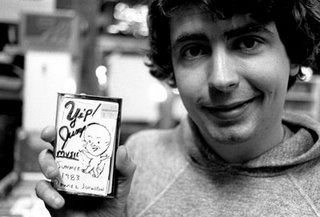I've got dots and they need connecting, okay, come on, topics-style:
K-punk on youth, boredom, and the pursuit of pleasure(Simon's response and sashay into food)Geeta on Eno and food That article in the new
Harper's about Christianity/America/Thoreau
and probably-not-so-coincidentally talking with the Movie Night crew about the eroticism of food over, wtf,
Branded to Kill***
Food is a necessity, and in that respect it's part of a routine; it’s moot.
Of course, the culture surrounding food is both external and superfluous, at least from a biological standpoint: eating together, preparing food together (and all requisite "simple living" nu-zen rhetoric), buying free-range/whole-food/fair trade/whatever. These are ethical and social gestures, depending.
I don't see the cooking metaphors in Geeta/Eno's writing as being a part of a culture/pleasure dichotomy like Simon seems to (unless I'm misunderstanding him); I see it as an art/life dichotomy.
Sure, it’s a pretty clichéd dichotomy, but think about it: Eno talks about faster, cheaper, more portable, whatever; he manages to reflect his approach to art in his approach to "life" (both the necessity of food, the culture of cooking, and the extension of his own personal style of cooking). I always thought the artlessness/non-musicianship of Eno was kind of pretentious in practice, but in theory, liberating: the point wasn't "just think, anyone can do this (spice here, spice there/let's patch A through B and see what happens)" but more "there is no
this to speak of that can be reasonably separated from just kinda existing." The radicalism of Eno’s food metaphors isn’t the precious yawn it produces in our consciousness and approach to music, but the fact that associating MUSIC with FOOD completely shakes the concept of how it fits into life: it becomes a necessity.
How we approach it is up for experimentation and discussion;
that we do isn’t. Which also explains, at least for me, the quasi-anorexia of dudes like Bobby Gillespie (Simon’s reference): real skyscraping sublime rock n’ roll feeling has nothing to do with necessity or daily life -— it’s all transcendence.
With all due respect to Geeta, she sort of nails the tendency for “culture” to treat these things like they were fucked up and ghastly: “My guess is that his path to lifelong weirdness…” Why exactly is it weird? We grow up thinking that attitudes like the ones that Eno has to food/music are fundamentally starched, inaccessible, and “arty” rather than actually permeable, fluid, and full of possibility. Marx thought art was a necessity; so did Thoreau. But making that argument now -— “take time with the things you do, make it healthy, be thorough, make creativity a part of daily life, immerse yourself, etc.” -— you just play into one of two societal boxes: arty (to the exclusion of the day-to-day) or you’re in some tier of Simple Living, whether it’s waiting in line at the Trader Joe’s (certain types of shopping have spiritual value, you know) or you’re like my friends Brandon and Hannah, who, despite being Brooklyn residents, fight the good fight by cultivating cooking herbs in their living room (Eno’s gardening & cooking metaphors tied into one literally “creative” rebellion).
I’m deeply turned on by all this, but made most cosmically supple by K-punk’s assertion that
“On this account, 'boring' is not opposed to 'interesting'. To be bored simply means to be removed from the communicative sensation-stimulus matrix of texting, MTV and fast food, to be denied, for a moment, the constant flow of sugary gratification on demand.”
This is basically what I wrote in my college thesis, which is a corny thing to reference, but the ideas still fascinate me. It was about Andy Warhol’s screen tests, which were basically what they sound like they would be —- 3-4 minute shots of a person keeping still, trying not to blink, showing their face for the screen. Warhol was actually a lot like Brian Eno, (a-)theoretically speaking. He didn’t care if you walked out on the films and came back in later. It wasn’t that important. The films just happened.
****, his 24-hour epic, is basically a psycho-conceptual joke: you think you’re supposed to ATTEND to it like ART, so you SIT THERE and get FRUSTRATED. You keep your expectations high—because art it supposed to take you out of life, not get all up in it—you don’t bliss out, you don’t get bored. Because the opposite of boredom isn’t interest, it’s
distraction.
Being truly bored is being enough at peace with something to let its structured meaning slip out of your mind: music-as-entertainment as opposed to wallpaper, cooking as a directed way to make food rather than a way to relax; product and pleasure remains the primary object. It’s when this happens that similarities open up -— the similarities like Eno’s cooking/production approach, or watching clouds pass into bunnies (no longer clouds), or just staring into Warhol’s face until you’re completely outside both the film and your own head. You’re no longer acting with it in an oppositional what-can-I-get-from-you kind of way, but something much more shadowy and difficult to articulate.
(As an aside, I know that Talking Heads and Warhol etc. were avowedly about finding wonder in “banality,” but phrasing it as such is sort of structurally inaccurate or at least playing into the dominant lexicon to begin with -— it’s only banal because of the way we treat it; they wanted to make the “boring” stuff in life the space in which we can fundamentally open our minds.)
Frank Kogan’s praised Richard Meltzer for talking about
Absolutely Live by the Doors in terms of food. Meltzer:
“"TV-Guide Pizza" (staple remover optional) to go with "Who Do You Love?" ("Dump the liquid grease all over [the pizza] and stick it back in the oven until it reaches desired crispyhood. And you can stick the staple remover on there too if you go for that. Yum-yum.”
And Kogan’s point is that you’d learn more about the album from his metaphor than any straight description, that it creates a context. Well, it’s a fast-food context and a backhanded pan -— no effort, no real satisfaction, a hack-job. The aural equivalent of a TV dinner. In “The Disco Tex Essay,” he calls contextual surprise in music “free lunch.”
While fast-food is weird in my expansion of K-punk’s context—it’s totally woven into daily life, but excises all of the “art/life” aspects of food -— you could also make the argument that it’s just fucking bad for you, I guess.


